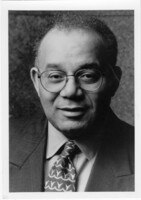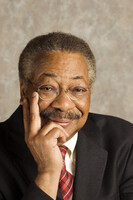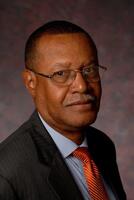Items
Array is exactly
Rutgers University-Newark
-
Interview: Browne, Joseph, 1991Joseph Browne founded the Black Organization of Students (BOS) together with Richard Roper. Browne grew up in Newark and attended white Catholic schools prior to coming to the university. He had left Rutgers for a time to join VISTA (Volunteers in Service to America) and participated in the Newark City Council election of 1968.
-
 Interview: Curvin, Robert, 1991 Robert Curvin, a retired U.S Army 1st Lieutenant, completed his undergraduate degree at Rutgers-Newark in 1960. He later went on to obtain a master's degree at Rutgers University School of Social Work and a Ph.D. in political science at Princeton University in 1975. At Rutgers-Newark, Curvin served as an Adjunct Professor in the political science department and served as a faculty advisor to the Black Organization of Students (BOS).
Interview: Curvin, Robert, 1991 Robert Curvin, a retired U.S Army 1st Lieutenant, completed his undergraduate degree at Rutgers-Newark in 1960. He later went on to obtain a master's degree at Rutgers University School of Social Work and a Ph.D. in political science at Princeton University in 1975. At Rutgers-Newark, Curvin served as an Adjunct Professor in the political science department and served as a faculty advisor to the Black Organization of Students (BOS). -
 Interview: Donaldson, Vickie, 1991 Vickie Donaldson was the most prominent woman in the Black Organization of Students (BOS) and played an instrumental role in the organizaing activities surrounding the 1969 takeover of Conklin Hall. She grew up in Florida and moved with her mother in Newark in 1967. At Rutgers, she joined the Congress of Racial Equality (CORE) and the campus NAACP chapter before gravitating to the BOS. She graduated from Rutgers-Newark College of Art and Sciences (NCAS) in 1972 with a degree in black studies and sociology. In 1974 she went on to obtain a graduate degree in political theory. She received her law degree from Rutgers in 1982. Since then, Vickie has served as the General Counsel to the Board of Education in Newark, as the town prosecutor in Orange, New Jersey, and is now practicing law in Newark.
Interview: Donaldson, Vickie, 1991 Vickie Donaldson was the most prominent woman in the Black Organization of Students (BOS) and played an instrumental role in the organizaing activities surrounding the 1969 takeover of Conklin Hall. She grew up in Florida and moved with her mother in Newark in 1967. At Rutgers, she joined the Congress of Racial Equality (CORE) and the campus NAACP chapter before gravitating to the BOS. She graduated from Rutgers-Newark College of Art and Sciences (NCAS) in 1972 with a degree in black studies and sociology. In 1974 she went on to obtain a graduate degree in political theory. She received her law degree from Rutgers in 1982. Since then, Vickie has served as the General Counsel to the Board of Education in Newark, as the town prosecutor in Orange, New Jersey, and is now practicing law in Newark. -
Interview: Jackson, Peter, 1991Peter Jackson graduated from Rutgers-Newark in 1969 and later joined the faculty in the Master of Public Administration program. He was a member of the Black Organization of Students (BOS) and was instrumental in negotiations with the university administration and in the group's takeover of Conklin Hall in February 1969.
-
Interview: Jones-Hicks, Delora, 1991Delora Jones-Hicks was secretary for the Business and Industrial Coordinating Council before joining Rutgers-Newark's Office of Public Information in 1968. During her time at the university, she wrote press releases, developed relationships with news organizations, planned events, and was in charge of public relations with the surrounding community. She also served as chair of the Organization of Black Faculty and Staff.
-
Interview: Lawrence, Lincoln, 1991Lincoln Lawrence grew up in Jersey City and received his bachelor of science from Jersey City State College and a master's degree in school administration and supervision from Seton Hall. From 1963 to 1967 he was a science teacher and cultural coordinator at West Kinney Junior High School in Newark. He later worked as supervisor of math and science teachers and director of School Audio-Visual Materials Center for the city of Newark and instructor of manpower training at the Montgomery School in Newark. In 1968 he became assistant director of admissions for the Rutgers-Newark campus, and from 1970 to 1987 he served as Assistant Dean of the Faculty of Arts and Sciences of Newark.
-
 Interview: Price, Clement A., 1991 Clement A. Price was born in Washington, D.C., in 1945 and attended the D.C. public schools. He received his bachelor's and master's degrees from University of Bridgeport. After a year teaching African American history at Essex County College, Price joined the faculty at Rutgers-Newark in 1969, where he was initially hired as a part-time instructor. Soon after his appointment in Newark, he enrolled in the history Ph.D. program at Rutgers-New Brunswick, which he completed in 1975. Dr. Price taught at Rutgers-Newark for 45 years and established himself as one of the university's most esteemed faculty members. He is the recipient of numerous awards and honors, including serving as chair of President Obama's transition team for the National Endowment for the Humanities and vice chair of the Advisory Council on Historic Preservation. He has played leadership roles with many organizations in New Jersey, including the New Jersey State Council on the Arts, the Fund for New Jersey, the Newark Public Schools, the Newark Black Film Festival, the Newark Public Library, the Newark Education Trust, and the Save Ellis Island Foundation. Over the years, Dr. Price has published widely in African American History, Urban American History, and American Cultural Policy. He continued teaching history at Rutgers-Newark as Board of Governors Distinguished Service Professor until his death in 2014. The Clement A. Price Institute on Ethnicity, Culture and the Modern Experience at Rutgers-Newark was named in his honor.
Interview: Price, Clement A., 1991 Clement A. Price was born in Washington, D.C., in 1945 and attended the D.C. public schools. He received his bachelor's and master's degrees from University of Bridgeport. After a year teaching African American history at Essex County College, Price joined the faculty at Rutgers-Newark in 1969, where he was initially hired as a part-time instructor. Soon after his appointment in Newark, he enrolled in the history Ph.D. program at Rutgers-New Brunswick, which he completed in 1975. Dr. Price taught at Rutgers-Newark for 45 years and established himself as one of the university's most esteemed faculty members. He is the recipient of numerous awards and honors, including serving as chair of President Obama's transition team for the National Endowment for the Humanities and vice chair of the Advisory Council on Historic Preservation. He has played leadership roles with many organizations in New Jersey, including the New Jersey State Council on the Arts, the Fund for New Jersey, the Newark Public Schools, the Newark Black Film Festival, the Newark Public Library, the Newark Education Trust, and the Save Ellis Island Foundation. Over the years, Dr. Price has published widely in African American History, Urban American History, and American Cultural Policy. He continued teaching history at Rutgers-Newark as Board of Governors Distinguished Service Professor until his death in 2014. The Clement A. Price Institute on Ethnicity, Culture and the Modern Experience at Rutgers-Newark was named in his honor. -
Interview: Ramsey, James H., 1992James Ramsey holds a bachelor's degree from Tennessee State University and a master's in education from Brown University. He began his career as a biology teacher in Cedar Grove, New Jersey, and joined Rutgers-Newark as a professor of biology in the Academic Foundations Department in 1969; he was appointed its director in 1970. The Academic Foundations Department provided remedial programs for students who were underprepared for college work. Ramsey was key in developing the center and making it an integral part of the university. Ramsey later served as mayor of Montclair, New Jersey, from 1984-1986 and on the Montclair board of education. He has also been active in numerous civic affairs in the City of Newark.
-
 Interview: Roper, Richard, 1991 Richard Roper graduated from Rutgers-Newark with a bachelor's degree in economics and completed a master's in public affairs at Princeton University. During his years at Rutgers-Newark, he served first as the president of the NAACP chapter, and then as co-founder and president of the Black Organization of Students (BOS), which was organized out of the time of social unrest following the Newark Riots and an era of civil rights struggle. After college Roper held a number of positions in Newark and federal government. He was a legislative aide and lobbyist for Newark's first African-American mayor, Kenneth Gibson, served as director of the Office of Newark Studies, was appointed special assistant to the secretary of commerce, Juanita Kreps under the Carter Administration, and served for 12 years as assistant dean at the Woodrow Wilson School of Public and International Affairs at Princeton University.
Interview: Roper, Richard, 1991 Richard Roper graduated from Rutgers-Newark with a bachelor's degree in economics and completed a master's in public affairs at Princeton University. During his years at Rutgers-Newark, he served first as the president of the NAACP chapter, and then as co-founder and president of the Black Organization of Students (BOS), which was organized out of the time of social unrest following the Newark Riots and an era of civil rights struggle. After college Roper held a number of positions in Newark and federal government. He was a legislative aide and lobbyist for Newark's first African-American mayor, Kenneth Gibson, served as director of the Office of Newark Studies, was appointed special assistant to the secretary of commerce, Juanita Kreps under the Carter Administration, and served for 12 years as assistant dean at the Woodrow Wilson School of Public and International Affairs at Princeton University. -
 Interview: Roper, Richard, 2019 Born in 1945 in DeLand, Florida, Richard W. Roper grew up in Brunswick, Georgia and attended public schools there. As a teenager, he became involved in the civil rights movement through a local chapter of the NAACP. After attending West Virginia State for two years, Roper enrolled at Rutgers-Newark's University College in 1965 and then transferred to the Rutgers Newark College of Arts and Sciences as a junior in 1966. He co-founded the Black Organization of Students (BOS) at Rutgers-Newark and made a presentation to the Rutgers Board of Governors in 1968 to address issues of diversity and representation on campus. After graduating in 1968, he worked for the Department of Higher Education in New Jersey, implementing the Educational Opportunity Fund (EOF) at its inception. When members of BOS occupied Conklin Hall in February 1969, Roper served as a liaison to the student protesters. He earned a M.P.A. from Princeton University's (then called) Woodrow Wilson School of Public and International Affairs. Early in his career, he worked as an education program director at the Greater Newark Urban Coalition, as an assistant to the director of the Division of Youth and Family Services, as a legislative aide for Newark Mayor Ken Gibson, and as Director of the Office of Newark Studies. He worked in the Carter administration as Special Assistant to Secretary of Commerce Juanita Kreps and then as Director of the Department's Office of State and Local Government Assistance. He held several positions over twelve years at Princeton's Woodrow Wilson School. He was a Senior Fellow at the Nelson A. Rockefeller Institute of Government. He served as the Director of the Port Authority of New York and New Jersey's Office of Economic and Policy Analysis and Office of Business and Job Opportunity. He ran his own consulting firm, the Roper Group, and then returned to the Port Authority as Director of the Planning Department. He has served on the Rutgers Board of Governors and on boards at La Casa de Don Pedro, New Jersey Coalition for Diverse and Inclusive Schools and Bethany Baptist Church in Newark. He is the co-editor of A Mayor for All the People: Ken Gibson's Newark.
Interview: Roper, Richard, 2019 Born in 1945 in DeLand, Florida, Richard W. Roper grew up in Brunswick, Georgia and attended public schools there. As a teenager, he became involved in the civil rights movement through a local chapter of the NAACP. After attending West Virginia State for two years, Roper enrolled at Rutgers-Newark's University College in 1965 and then transferred to the Rutgers Newark College of Arts and Sciences as a junior in 1966. He co-founded the Black Organization of Students (BOS) at Rutgers-Newark and made a presentation to the Rutgers Board of Governors in 1968 to address issues of diversity and representation on campus. After graduating in 1968, he worked for the Department of Higher Education in New Jersey, implementing the Educational Opportunity Fund (EOF) at its inception. When members of BOS occupied Conklin Hall in February 1969, Roper served as a liaison to the student protesters. He earned a M.P.A. from Princeton University's (then called) Woodrow Wilson School of Public and International Affairs. Early in his career, he worked as an education program director at the Greater Newark Urban Coalition, as an assistant to the director of the Division of Youth and Family Services, as a legislative aide for Newark Mayor Ken Gibson, and as Director of the Office of Newark Studies. He worked in the Carter administration as Special Assistant to Secretary of Commerce Juanita Kreps and then as Director of the Department's Office of State and Local Government Assistance. He held several positions over twelve years at Princeton's Woodrow Wilson School. He was a Senior Fellow at the Nelson A. Rockefeller Institute of Government. He served as the Director of the Port Authority of New York and New Jersey's Office of Economic and Policy Analysis and Office of Business and Job Opportunity. He ran his own consulting firm, the Roper Group, and then returned to the Port Authority as Director of the Planning Department. He has served on the Rutgers Board of Governors and on boards at La Casa de Don Pedro, New Jersey Coalition for Diverse and Inclusive Schools and Bethany Baptist Church in Newark. He is the co-editor of A Mayor for All the People: Ken Gibson's Newark. -
Interview: Sanks King, Vivian, 1991Vivian Sanks King was a member of the NAACP while enrolled at Rutgers-Newark, but migrated toward the more militant Black Organization of Students (BOS), and became an active leader. She graduated in 1970 with a political science degree from the College of Arts and Sciences at Rutgers-Newark, and in 1985 completed her law degree at Seton Hall Law School. She served as General Counsel for the University Medicine and Dentistry of New Jersey (UMDNJ) before going into private practice and has received numerous awards and honors for her dedicated service in law and policy. She presently serves on the Boards of Leadership Newark, New Jersey Public Policy Research Institute, Planned Parenthood of Metropolitan New Jersey, New Jersey Women and AIDS Network, the Garden State Bar Association, and is past chair of the Community Health Law Project.
-
Interview: Snell, Harrison, 1991Harrison Snell grew up in Newark and graduated from Rutgers-Newark in 1970. He received his law degree from Rutgers-Newark School of Law in 1973, and has practiced law for many years as a member of the State Bar Associations of New Jersey, New York, and Washington, DC. While at Rutgers-Newark, he served as president of the Black Organization of Students (BOS) and played an integral part in the planning and negotiation of the 1969 takeover of Conklin Hall and related events.
-
Interview: Stokes, Ronald J., 2015Ronald J. Stokes was born in East Orange, New Jersey in 1946. During the Vietnam War, Stokes served in the United States Army. He attended Rutgers-Newark and graduated with a degree in Management in 1983.
-
Rutgers-Newark in the 1960s and 1970s Oral History CollectionRutgers University librarian Gil Cohen conducted 60 oral history interviews as part of a project to document the city of Newark and Rutgers University-Newark as they were in the 1960s and 1970s. This collection includes 11 interviews with Black students, faculty, and administrators who discuss their memories of the 1969 Conklin Hall takeover by the Black Organization of Students (BOS). The interviews were recorded in the early 1990s, and the collection is housed at Special Collections and University Archives in New Brunswick. The audio recordings and transcripts for this collection have been fully digitized by Rutgers University Libraries.
